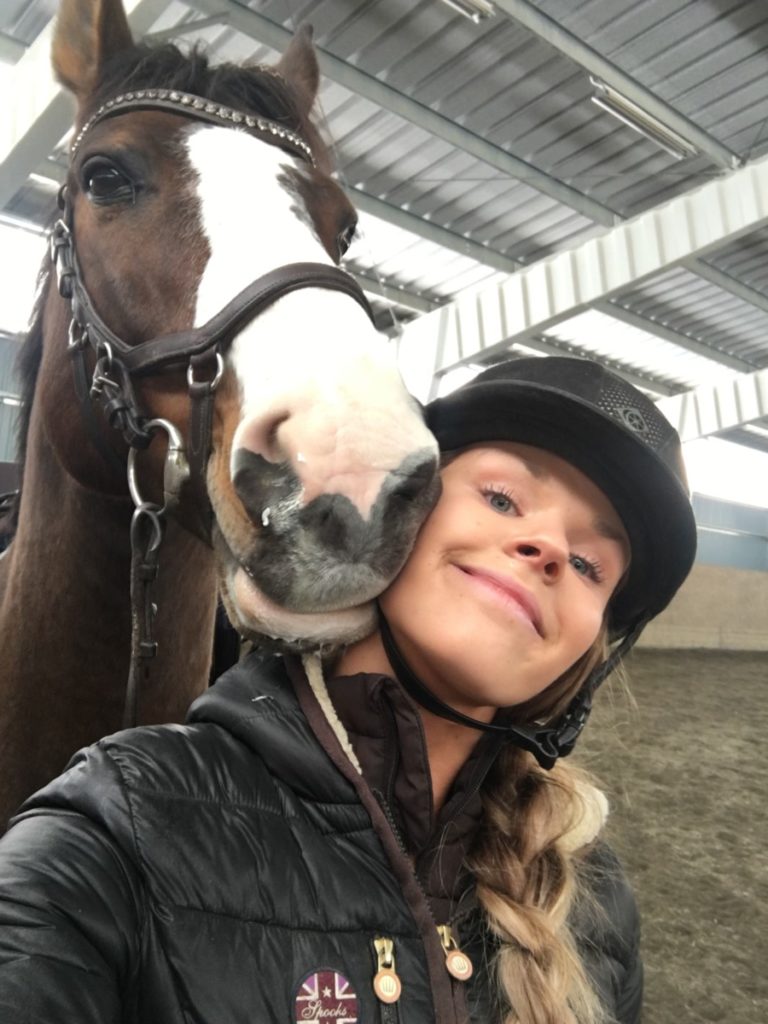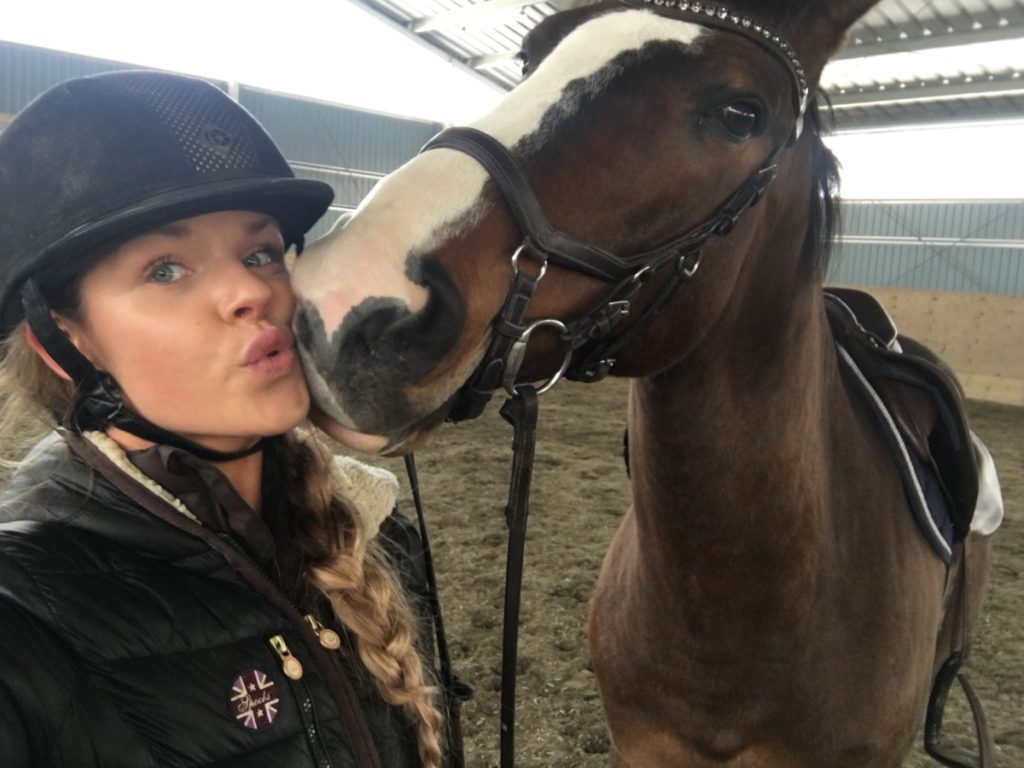If you’ve ever spent time around horses, you may have seen one rubbing its face against a fence post, tree, or even another horse. An occasional face scratch here and there is normal, but sometimes horses can rub their faces excessively or very aggressively, and it may make you wonder if you need to be concerned about their level of discomfort.
You do not need to be overly concerned when a horse keeps rubbing its face. Horses rub their faces to get relief from an itch. It is a natural and common habit that is not cause for alarm.
Horses can rub their faces for a variety of reasons. It’s helpful to know what the common causes of excessive face itching are so that you can understand why your horse may be rubbing against his favorite fence post a little more often than usual. The list below outlines the most common causes of excessive face itching and the symptoms that accompany them.

Why do Horses Rub Their Face?
When a horse is rubbing its face against something, the most likely reason is that it’s trying to scratch an itch. Horses are just like any other animal – they get itchy spots that need to be scratched one way or another. There are many reasons a horse can have an itchy face, including:
- Sweat After a Hot or Challenging Ride
- Itchy or Uncomfortable Bridle
- Allergies
- Sweet Itch
- Parasites
Some of these reasons are very typical for horses and can be easily managed with a little extra care and attention to cleaning habits. However, some issues may need medical intervention and further treatment. If you’re able to recognize the symptoms that accompany these reasons, you can more easily determine why your horse may be rubbing their face more frequently than usual. Once you’ve determined the cause, you can help them relieve the itch by using some of the techniques listed below.
Sweat After a Hot or Challenging Ride
If you notice that your horse rubs its face more frequently after returning from a particularly hot or fast-paced ride, it may simply be reacting to sweat on their face. Sweat can collect under a horse’s bridle and around the bit and cause itching or discomfort, particularly in hot or humid weather. If you notice that your horse has accumulated sweat on their face and is continually rubbing it, try placing a cold wet washcloth or towel over their face to bring them some relief. You can also give your horse a cold hose-down to help them cool off.
Itchy or Uncomfortable Bridle

Wearing a bridle for extended periods of time can be a minor irritation and cause some horses to vigorously rub their face once it has been removed. This can particularly be a problem in hotter months when sweat and dust collect under the bridle. One of the most effective ways to help relieve bridle itch is to literally give your horse a helping hand. After removing your horse’s bridle, give their face a rub-down with a bristled brush or curry comb. Not only will you help relieve your horse’s itch, but you’ll get some quality bonding time in as well!
If you notice any raised bumps or hives on the face around where the bridle is placed, your horse may be having an allergic reaction to the material on the bridle or bit. In this case, you’ll have to find another bridle for your horse that won’t irritate their skin.
Allergies
Horses may be thick-skinned, but they are actually very susceptible to all sorts of allergies. Horses generally display allergic reactions through their skin or respiratory systems. This means that a horse who has been rubbing its face excessively could be exhibiting signs of an allergic reaction that is causing facial itching and discomfort. Below is a list of the most common allergens that horses may encounter and the ways in which they may manifest themselves on a horse’s face.
- Plants and Pollen
- Food Allergens
- Contact Allergens
- Musty Hay or Bedding
Plants
It is not uncommon for horses to have allergic reactions to certain plants or airborne pollen during the spring and summer months. Horses will generally display allergic reactions similar to those seen in humans, including:
- Red or Watery Eyes
- Runny Nose
- Dry or Flaky Skin
- Contact Dermatitis Around Nose and Muzzle
- Hives
If you notice your horse has been frequently rubbing their face and is displaying one or more of these symptoms, a plant-borne allergen could likely be the culprit. Allergies will often clear up on their own or once the weather gets cooler. However, if your horse seems very agitated or is breaking out in hives, you should contact a veterinarian to help you identify the allergen.
Food Allergens
Severe allergic reactions to food are very uncommon in horses. However, just as a human might get a stomach ache from eating a food that doesn’t agree with them, horses can have adverse reactions to certain foods. If a horse is having an adverse reaction to something in its food, you may notice the following symptoms that could lead to increased face rubbing:
- Itchy Skin
- Red or Scaly Skin
- Hair Loss
- Localized swelling
- Hives
- Self-Trauma from Scratching
If you suspect your horse is allergic to something in its food, you may have to try an elimination diet to narrow down the offending nutrient. This can be time-consuming depending on how many ingredients are in your horse’s food. If you’re having trouble figuring out which ingredient is the culprit, you can also contact a veterinarian to perform an allergy test.
Contact Allergens
A horse can also get itchy skin or have adverse reactions to products that come into direct contact with their skin, such as tack equipment or cleaning products. If your horse is frequently rubbing its face after being brushed or washed, it could be reacting to something in its shampoo or brushes. This can usually easily by solved by using hypo-allergenic shampoo and grooming supplies. Listed below are some of the most popular hypoallergenic shampoo options for horses.
There are plenty of hypoallergenic brushes and tack equipment on the market for horses with sensitive skin. If you suspect your horse has a contact allergy, it will be worth investing in these products to ensure your horse is clean and comfortable.
Musty Hay or Bedding
While hay itself is highly unlikely to cause an allergic reaction in a horse, dust or mold found in the hay could do the trick. In addition to an itchy face and increased head rubbing, your horse will likely experience respiratory symptoms if they are experiencing a hay-related allergy. That’s why it’s extremely important to keep a horse’s stall clean and continually add fresh hay, especially during colder months when horses are spending more time in their stalls.
Sweet Itch
Sweet Itch, or Summer Seasonal Recurrent Dermatitis, is one of the most commonly-known itching plagues to affect horses during the summer. Sweet Itch is the result of a horse’s allergic reaction from being bitten by a gnat called Colicoides midge, more commonly known as a “no-see-um.” These tiny gnats are almost impossible to see, and come around with a vengeance in hot, humid weather or where stagnant water is present. Dorsal feeders will go for the ears and mane, while Ventral feeders will cause issues on the face.
The symptoms of Sweet Itch can become visible within 48 hours of a horse being bitten, and include:
- Red and Inflamed Skin
- Severe Itching and Rubbing of Affected Areas
- Hair Loss in Affected Areas
- Crusting or Weeping Sores
Fortunately, symptoms of Sweet Itch will disappear in the winter, but you should still take preventative measures during hot weather to ensure your horse’s comfort. Make sure you keep pastures well-drained to avoid any stagnant water collecting, and always make sure your horse has fresh drinking water. In addition, you may want to keep your horses in their stalls after dusk during the summer when these gnats are most active.
Parasites
Because horses live the majority of their lives outdoors, they can fall prey to a number of internal and external parasites. External parasites can cause intense discomfort and anxiety for a horse, even if they don’t necessarily cause any visible external damage. Common external parasites that could leave horses rubbing their faces more frequently include:
- Mosquitoes
- Lice
- Mites
- House Flies
- Horse Flies
- Deer Flies
If your horse seems agitated and is rubbing its face more often than usual, check it for the presence of any of these parasites. Many horse owners use a fly mask to protect their horse’s face and ears from the bites of flies and mosquitoes. They are cost-effective and easy to use and can bring your horse immense relief from having to constantly rub its face to keep pests at bay.
It can be difficult to diagnose exactly why a horse may be rubbing its face more often than usual, but starting with the common reasons listed above will help you determine how to start diagnosing the underlying cause. Many of these issues can be easily solved and will bring your horse instantaneous and much-appreciated relief.
